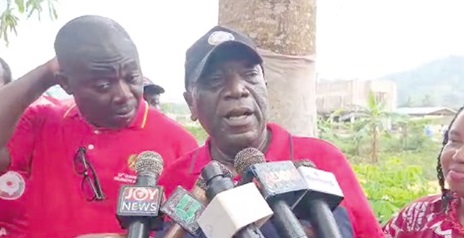The Trades Union Congress (TUC) has called on government to take decisive measures to end the illegal mining activities, otherwise known as galamsey, to save the country's waterbodies and the general environment.
The Secretary-General of the TUC, Joshua Ansah, said while there had been a lot of meetings and some action to halt the activities of illegal miners on the devastating impact of their activities in communities across the country, there must be firmer, concrete action on the ground to tackle the menace.
He said it was time for government to launch an attack on galamsey in a more brutal manner to save waterbodies and the environment from further devastation.
Mr Ansah made the statement last Friday upon briefing by the Eastern Regional Manager of the Ghana Water Limited (GWL), Paul Akpanya, at Cape Coast about the shutdown of two water treatment plants over the impact of galamsey activities.
The Kyebi Water Treatment Plant in the Eastern Region has been shut down for about two months now due to the impact of illegal mining on its operations.
The plant has been impacted by illegal mining activities along the banks of the water source and the Brim River, which is the main feed to the treatment plant.
The situation has impacted the daily lives of the people in the area.
Visit
The TUC leadership toured two water treatment plants at Agona Kwanyako and Kyebi in the Eastern Region to assess the impact of galamsey on the two plants.
The two treatment plants have suffered alarming effects of the galamsey operations, impacting water supply to the catchment communities.
Agona Swedru and its environs have, in the last months, suffered water shortages due to the Agona Kwanyarko treatment plant’s intermittent operations as a result of the sludge in the intake point.
Residents now resort to water from unhygienic sources.
Shock
Mr Ansah said the TUC was shocked at the devastation caused by illegal mining to the water treatment plants, stressing that the impact was disturbing.
“It’s really sad. What we have heard and seen with our own eyes this morning is alarming.
“Immediate action needs to be taken or it’s going to be very difficult.
They’ve had to install a new pump at the surface just to draw a little water for use.
“If urgent steps are not taken, the entire plant could shut down, and water will become a scarce commodity for Ghanaians,” the TUC Secretary-General said.
He said every Ghanaian who understood the level of destruction caused by illegal mining to the environment must be worried and commit to take action, and urged government to take urgent steps to curb the menace.
“Today has dampened our spirit, but it has also strengthened our resolve.
We will engage the government to take pragmatic measures to end galamsey once and for all.
“Whatever means it takes to curb this menace, we will demand it.
A state of emergency is both urgent and necessary,” Mr Ansah stated.
The TUC Secretary-General further indicated that the TUC leadership would convene after completing a nationwide inspection of water treatment facilities to determine the next course of action.
“For now, we are issuing a strong caution and urging the President to act without delay. Galamsey must stop, and it must stop now,” Mr Ansah said.
Mr Akpanya said activities of the illegal miners had caused the turbidity levels at the treatment plants to reach 22,000 Nephelometric Turbidity Units (NTU).
He explained that this was because the treatment systems were designed to treat clean water and not sludgy water.
“When this happens, our pumps are unable to treat.
So, in August this year, when we experienced the 22,000 NTU figure, we were forced to shut down the treatment plant,” Mr Akpanya stated.
Why the shutdown
Mr Akpanya indicated that continuing production would have led to the deterioration of the pumping systems and resulted in frequent repairs.
He said apart from the increased chemical cost, they would have to throw away a lot of untreatable water.
At a point, he said, the coagulants could not even cause the sludgy water to settle due to the heavy silt.
As of the time of the visit, the GWL Regional Manager said the turbidity figures hovered between 5,000 NTU and 8,000 NTU, which he said were still higher than what the plant could treat.

